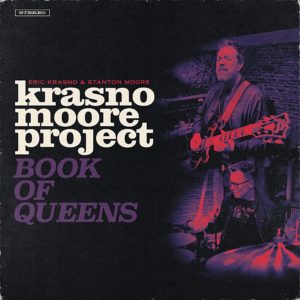Soulful, contemplative and full of warmth, drummer Stanton Moore and guitarist Eric Krasno’s first-ever studio recording sees the frequent collaborators tackle instrumental renditions of songs made famous by a range of women vocalists, from Amy Winehouse to Kacey Musgraves to Nina Simone.
Working alongside Hammond B3 organist and keyboardist Eric Finland—with cameos by Branford Marsalis, Cory Henry and Robert Randolph—Krasno and Moore are at their best here when they lean into the ’60s soul-jazz organ trio tradition, opting for slow-simmering grooves over big, burning solos. It’s a subdued aesthetic, particularly given Krasno and Moore’s respective work in their more jam-oriented projects Lettuce, Soulive and Galactic, but it gives each player space to stretch out without detracting from the album’s overall balanced trio sound. The organ trio vibe—particularly the lack of a vocalist—also opens new musical doors, highlighting unexpected elements of some songs and casting new light on others, courtesy of shifts in mood or rhythm.
The opener is a case in point. A dreamy, psychedelic version of Winehouse’s “You Know I’m No Good,” Krasno and Moore’s take features a reverb-heavy melody pushing up against a thick and rolling beat. Taken together, the dynamic creates a layer of tension that feels more playful than the drama embedded in Winehouse’s darker original. Later, on the Marsalis-assisted “Fever,” the saxophonist’s first batch of warm, round tones complement Krasno’s bluesy riffs before things change direction and Marsalis takes the reins, pitching the tune into new, fiery territory. Henry’s contribution—he trades trombone for keys on Brittany Howard’s “Stay High”—is a highlight, too, replete with laidback, sunny grooves that give way to a climactic finish. The standout, though, is the gospel and blues-drenched take on “I Wish I Knew How It Would Feel To Be Free.” Written by Billy Taylor but largely associated with Simone after the stirring cover she recorded for 1967s Silk and Soul, the tune welcomes pedal steel guitarist Robert Randolph to the mix, layering soaring peels of sound to close the album with a freedom that doubles as a trip to church.
It’s a bit odd that a recording billed as a celebration of women in music features only men, particularly given the album’s multiple guest spots. And some of the more pop-centric covers, like Billie Eilish’s “Lost Cause,” never quite find their footing. But between the open feel of the material here—and the additional guest artists who’ve surfaced on Krasno and Moore’s spring tour—the project seems designed with room to grow.



